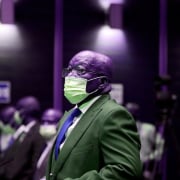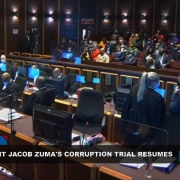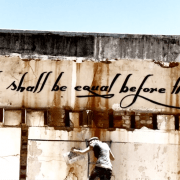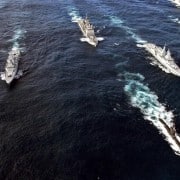|
Getting your Trinity Audio player ready...
|
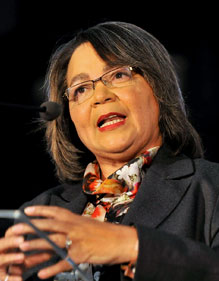
By Lee-Ann Alfreds
Almost 15 years after she stood up in Parliament and alleged – to vilification, boos and insults from ANC MPs – large-scale corruption in the arms deal, Patricia de Lille is about to repeat her claims. This time, though, she hopes the outcome will be different.
For starters, she will be testifying about the allegations before the Arms Procurement Commission, which has been tasked with investigating allegations of fraud, corruption, irregularity and impropriety in the 1999 arms deal, and not before a roomful of hostile MPs. Secondly, several of her allegations have already been proved over the last 14 years – leading to the successful prosecution of former ANC chief whip Tony Yengeni and politically connected businessman and Jacob Zuma benefactor Schabir Shaik for fraud and corruption – and so her integrity and intentions will not be questioned.
Lastly, she won’t live in fear for her life – back then De Lille received death threats and was followed for two years.
But no matter what happens today, De Lille, now mayor of Cape Town, is looking forward to her day in court. “It will be a relief to me (to testify),” she says in an interview with Corruption Watch. “I’ve done my bit. I love my country. Testifying on the 24th July will help me to get this thing out of my system once and for all. It will be a relief to me to leave it in the hands of the commission.”
The first to protest
It is not surprising that the former MP for the Pan Africanist Congress is looking forward to testifying. The burden of the arms deal has been a heavy one for De Lille, who first raised her concerns about it in Parliament on 9 September 1999, after receiving a briefing document full of allegations of corruption signed by “Concerned ANC MPs”.
The document – which has come to be known as the De Lille Dossier – contained a host of allegations of wrongdoing against senior ANC members and government officials who had apparently enriched themselves during the deal. It pointed to actual instances of alleged corruption by top officials and leading ANC politicians, and alleged that millions of pounds went either to senior ANC members or their families through a web of companies that won lucrative positions as sub-contractors. There was also speculation that some of the money found its way into the ANC’s coffers. Among those accused of benefiting illegally were then defence minister Joe Modise, Yengeni and Chippy Shaik, head of procurement for the defence department, and brother of Schabir.
De Lille called then for a commission of enquiry to investigate the allegations, but it took 12 years for her calls to bear fruit. In 2011 President Jacob Zuma authorised the establishment of the commission, which took another three years to get hearings under way.
“I’ve been calling for a commission of enquiry since 9 September 1999, so I’m certainly going to attend,” she says. “I will be saying what I have been saying for the past 14 years, that all the allegations contained in the De Lille Dossier need to be investigated … that we need to pursue the investigation to its logical conclusion, which is that any evidence found by the commission, the people who have alleged to be involved, must be charged and prosecuted.”
De Lille also disagrees with the insistence by former finance minister Trevor Manuel that cancelling the contracts would be ruinous for South Africa’s international credit-worthiness. “It’s about fairness and justice and it’s about being very firm when we deal with any allegations of corruption. Foreign firms were also alleged to be involved in this corruption. I would rather say that if we find that any company was involved in corruption, they should be blacklisted and we never do business with them again.”
There’s no going back
However despite her delight at having her day in court, De Lille, who also testified in the fraud and corruption trial of Schabir Shaik, is sceptical about one issue specifically – that the commission has to report to President Jacob Zuma, who has been implicated in wrongdoing in relation to the deal. “This isn’t normal. I’ve expressed reservations about that. I don’t see the purpose of that (reporting to the president). I’m still concerned.”
And while she hopes that the commission will finally uncover the truth behind the deal, De Lille is under no illusion that South Africa will be able to put the genie back in the box. “The arms deal was the first indictment and stain on our new democracy. While there was a need to review the SA National Defence Force, there was no need whatsoever (for the amount of money that was spent). What we should have gone out to buy was a VW, instead we decided to buy a Bentley at massively inflated prices.
“The arms deal was the first litmus test for our new democracy … and we failed hopelessly. It set the scene and an example that it’s okay to be corrupt, it’s okay to steal and to enrich yourself. It set us on the slippery slide down.”
De Lille feels the arms deal has irreversibly changed the country for the worse. “Ordinary crooks look at it and say ‘it’s fine, the government is doing it’. Their chances of getting arrested are slim, crime is worse after the arms deal. We have muddied our future. I don’t think we’ve ever going to recover from it.”


